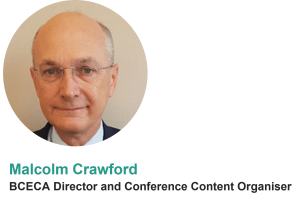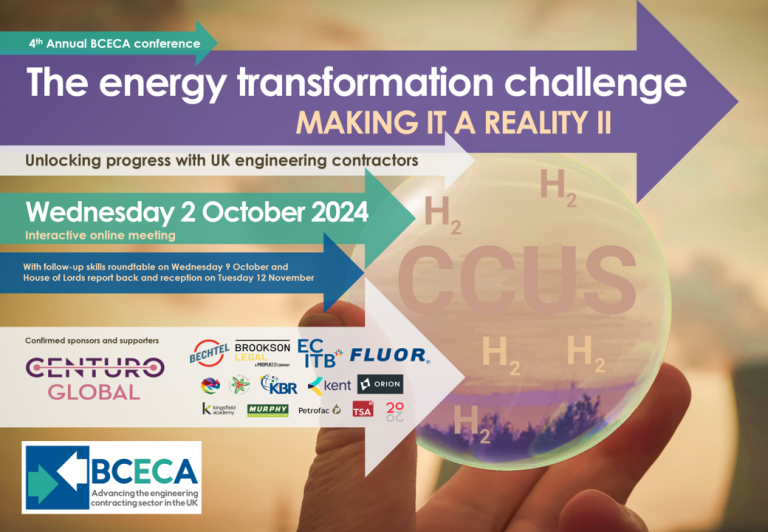Everyone is talking about the energy transformation. Most would agree that it's a good thing, both in terms of tackling climate change and as a catalyst for the urgent need for economic growth, employment opportunity, and regional regeneration in the UK.
Yet despite the announcement of nine locations for carbon capture and/or full-chain hydrogen projects in various locations around the UK, progress remains tantalisingly slow. Notable amongst these are the HyNet Cluster in North West England, which includes the Stanlow refinery complex and the East Coast Cluster based on Teesside. BCECA member companies, including Eni UK, Costain Group PLC, Kent, KBR, Inc., Technip, Wood and Worley, are heavily involved, and final investment decisions for major projects in both clusters are anticipated this autumn. Elsewhere, BCECA member companies have successfully bid for a wide range of conceptual design, pre-FEED and FEED work on many other net zero projects around the UK.
There are good grounds for optimism. Nonetheless, the companies that will ultimately be tasked with the engineering, procurement, and construction of this vital low-carbon energy infrastructure need political stability and certainty to get the job done. With the election of a new Westminster government with a large working majority, the first part of this equation looks to be in place. However, questions around policy frameworks, contract models and the health of the skills pipeline must be addressed before the spade work can begin in earnest. These and other key questions will be the focus of the conversation at BCECA's 4th virtual annual conference, which will take place on Wednesday, 2 October 2024. Here's a preview of what's in store for participants this year.
The programme is built around four main themes. For the first time in 2024, our virtual conference is being expanded to include a stand-alone breakout session one week later, on Wednesday, 9 October. This will permit a more in-depth discussion on the complex issues of resource flexibility and global workforce mobility.
Building on the success of previous virtual gatherings, we have expanded the capacity to 400 participants. Once again, there will be no charge for registration, thanks to the generosity of our sponsors and supporters. Over half of the available places are taken at the time of writing. The conference will likely be fully booked well before we go live, with strong representation from beyond BCECA's core membership, with clients, suppliers, consultants, and academics in attendance. Given the importance of the topic, I would like you to share this blog with colleagues and encourage them to participate.
The agenda is now in the final stages of preparation. Here's a session-by-session summary of where we're at.
Session 1 – Unlocking the energy transformation – where's the key?
 After a scene-setting introduction by our Chair, Mark Stanton of Fluor Corporation, we'll get straight down to business with the welcome return of Crossbench Peer Lord Ravensdale (left). Much has changed since the UK General Election in July. Still, we've asked Lord Ravensdale to cut through the party-political rhetoric and offer an independent perspective of the new government's policy offer and likely direction of travel. Lord Ravensdale is a chartered engineer, and his practical knowledge from working with AtkinsRéalis in the nuclear industry gives an engineering perspective from the benches of the House of Lords. We will then examine progress on the EET Blue Hydrogen Project. EET is a core component of the HyNet cluster with a planned capacity of 4,000 MW by 2030. KBR, Inc. Andrew Delugar will provide an overview of the design and current challenges. The opening session will conclude with a contribution from Mark Woolaghan of Bechtel Corporation. Mark will offer a main contractor's viewpoint on the UK's readiness to move into the construction phase. What strengths do we have in the UK to get these projects up and running, and where are the challenges?
After a scene-setting introduction by our Chair, Mark Stanton of Fluor Corporation, we'll get straight down to business with the welcome return of Crossbench Peer Lord Ravensdale (left). Much has changed since the UK General Election in July. Still, we've asked Lord Ravensdale to cut through the party-political rhetoric and offer an independent perspective of the new government's policy offer and likely direction of travel. Lord Ravensdale is a chartered engineer, and his practical knowledge from working with AtkinsRéalis in the nuclear industry gives an engineering perspective from the benches of the House of Lords. We will then examine progress on the EET Blue Hydrogen Project. EET is a core component of the HyNet cluster with a planned capacity of 4,000 MW by 2030. KBR, Inc. Andrew Delugar will provide an overview of the design and current challenges. The opening session will conclude with a contribution from Mark Woolaghan of Bechtel Corporation. Mark will offer a main contractor's viewpoint on the UK's readiness to move into the construction phase. What strengths do we have in the UK to get these projects up and running, and where are the challenges?Session 2 – Doing the right thing – safeguarding people, protecting the environment.
 Implementing new and novel energy solutions will inevitably present health, safety, and environmental challenges. Two expert contributions have been confirmed: Adam Chisholm (left) from the Health and Safety Executive will discuss health and safety considerations applicable to carbon capture and hydrogen projects. Gareth MacGlennon PIEMA from Petrofac will examine the environmental challenges associated with carbon capture projects. A panel Q&A session with plenty of opportunity for input from the virtual audience will follow the presentations.
Implementing new and novel energy solutions will inevitably present health, safety, and environmental challenges. Two expert contributions have been confirmed: Adam Chisholm (left) from the Health and Safety Executive will discuss health and safety considerations applicable to carbon capture and hydrogen projects. Gareth MacGlennon PIEMA from Petrofac will examine the environmental challenges associated with carbon capture projects. A panel Q&A session with plenty of opportunity for input from the virtual audience will follow the presentations.The morning will conclude with a presentation by members of BCECA's Early Career Professionals Group. Based on survey work carried out in member companies, participants can expect a frank assessment of current perceptions of career opportunities in the engineering contracting sector. The findings and subsequent discussion will shape BCECA's thinking on future employee recruitment and retention approaches.
Session 3 – Project delivery derisked – solutions to the contract conundrum.
 After a virtual lunch break – sadly, we aren't yet able to supply digital sandwiches – the conference will move on to assess the tricky question of what are the most effective contract models for low-carbon energy projects? Keynote speaker John Fotherby (left) from Kingsfield Academy and President of the European Construction Institute will lead with a viewpoint that traditional contracting models do not suit energy transformation projects, given the unknowns and risks involved. John will argue that more collaborative models are needed, giving due consideration to project specifics, risk appetite and policy objectives. Trade-offs are inevitable, and he will present ideas for different approaches that could effectively facilitate the UK's energy transformation. A panel discussion and Q&A with invited experts from the client, contracting and supply chain community will follow John's keynote.
After a virtual lunch break – sadly, we aren't yet able to supply digital sandwiches – the conference will move on to assess the tricky question of what are the most effective contract models for low-carbon energy projects? Keynote speaker John Fotherby (left) from Kingsfield Academy and President of the European Construction Institute will lead with a viewpoint that traditional contracting models do not suit energy transformation projects, given the unknowns and risks involved. John will argue that more collaborative models are needed, giving due consideration to project specifics, risk appetite and policy objectives. Trade-offs are inevitable, and he will present ideas for different approaches that could effectively facilitate the UK's energy transformation. A panel discussion and Q&A with invited experts from the client, contracting and supply chain community will follow John's keynote.
Session 4 – Lessons learned - technology selection and project experience.
 This year's main conference concludes with two presentations on technology selection and two on project design experience. Graham Hinton of Johnson Matthey will start with a presentation on syngas technologies and their role in energy transformation. Next up is Duncan McSorland from UOP, a Honeywell Company, who is assessing carbon capture technologies for different project applications.
This year's main conference concludes with two presentations on technology selection and two on project design experience. Graham Hinton of Johnson Matthey will start with a presentation on syngas technologies and their role in energy transformation. Next up is Duncan McSorland from UOP, a Honeywell Company, who is assessing carbon capture technologies for different project applications.We will finish with two design-related presentations. Dr Jorge Arizmendi-Sanchez from Kent will present on the design of electrolytic hydrogen production plants based on the experience with UK facilities. Then, Niku Nobakhti (left) of Costain Group PLC will close the main agenda with an overview of the design of the world's first overground carbon dioxide pipeline for the Teesside Carbon Capture Hub.
The day will wrap up with a summary of the proceedings from our CEO, Tracey Shelley. The full findings will be written in a short report published at a reception in the House of Lords hosted by Lord Ravensdale on Tuesday 12 November 2024. All conference participants will receive an invitation to the reception. You can get a flavour of the discussion by reading our 2023 conference report here: https://online.fliphtml5.com/axraw/lwfc/
New breakout Session: Powering the energy transformation with a skilled workforce of the future.
New for 2024, this additional online session, taking place a week after the main conference, will be a discussion panel of industry experts looking at the critical recruitment challenges facing the energy sector. The session will be led by Centuro Global, which has created a one-stop-shop global expansion management platform covering over 170 countries. Centuro Global will evaluate the challenges caused by a lack of home-grown skills and the difficulties of moving a skilled workforce around the globe to meet needs in particular locations. To navigate these pressing challenges and meet energy transformation needs, valuable insights and strategies will be given.
Registration for the breakout session is through the main conference hub at https://cvent.me/vXlzly for delegates attending the main conference. However, those wishing to attend the skills breakout only, can register by emailing [email protected] for more details.
Making it a reality – we've been here before.
Engineers, scientists and technicians have been fundamental to economic transformation for almost three centuries. Decarbonising global energy systems by 2050 is the next stage in that journey, but if internationally agreed emissions reduction targets are going to be achieved, a step change in progress is needed.
UK engineering contracting and consulting companies and their supply chain partners are transforming process and energy systems globally. BCECA provides a collective voice for the UK's engineering contracting community. This year's conference will offer a perspective on making the energy transformation a reality, as seen from the viewpoint of the engineering contracting community that must deliver the projects that will make it happen.
Come and join us for this important conversation.
Register via our conference hub today, or for more information, drop me an email at [email protected]



